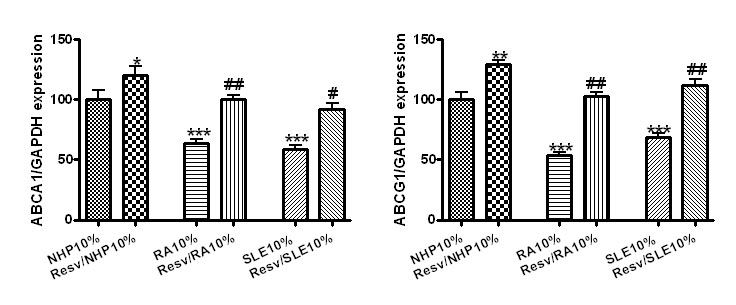Session Information
Session Type: Abstract Submissions (ACR)
Background/Purpose: Our group has demonstrated that resveratrol, a plant polyphenol, possesses atheroprotective properties, enhancing expression of reverse cholesterol transport (RCT) proteins. We have reported that Systemic Lupus Erythematosus (SLE) and rheumatoid arthritis (RA) patients manifest a pattern of disturbance in expression of RCT genes that is atheroma-promoting. The cholesterol efflux proteins 27-hydroxylase, ATP binding cassette transporter (ABC) A1 and ABCG1 are suppressed by plasma from persons with these autoimmune rheumatic diseases. These proteins are crucial for efficient cholesterol efflux from macrophages, a process that prevents foam cell formation (FCF) and protects against atherosclerosis. This study examines whether resveratrol can protect macrophages from pro-atherogenic effects of SLE and RA plasma on cholesterol metabolism.
Methods: ABCA1, ABCG1 and 27-hydroxylase expression were evaluated in THP-1 human macrophages, a pertinent model of atherosclerosis. Cells were incubated for 18h in 10% pooled SLE, RA or normal human plasma (NHP) ± resveratrol (25µM). mRNA was isolated and reverse transcribed. The resulting cDNA was subjected to quantitative PCR with specific primers for each gene. Cell extracts were prepared for immunoblotting after 24h. FCF was quantified as % oil red O stained cells. Studies were done in triplicate.
Results: 10% SLE plasma suppressed ABCA1 and ABCG1 expression by 58.3 ± 15.5% (n=3, P<0.001) and 48.3 ± 18.7% (n=3, P<0.01) below NHP, respectively (NHP set as 100%). 10% RA plasma induced similar levels of ABC transporter downregulation. 27-hydroxylase message level fell by 36.2 ±12.8% and 49.1 ± 14.7% (n=3, P<0.01) below NHP, respectively for SLE and RA plasma. When THP-1 macrophages were incubated with SLE or RA plasma + resveratrol, the resveratrol significantly negated downregulation of efflux proteins, restoring levels to that observed with NHP (Fig 1). FCF by THP-1 macrophages was significantly reduced by addition of resveratrol compared to SLE or RA plasma alone (by 22.2±5.1% and 35±7.5%, respectively [n=3, P<0.01]).
Conclusion: Resveratrol is able to counteract pro-atherogenic factors in SLE and RA plasma. Resveratrol acts as an anti-atherogenic agent by preventing lipid overload via effects on cholesterol transport. Since resveratrol has a strong safety profile and is well-tolerated, low cost, and can be used in combination with multiple other therapies without contraindication, these findings provide the rationale for a novel therapeutic approach to decrease the cardiovascular consequences of RA and SLE. Administration of resveratrol in these groups of patients might restore a critical defense mechanism against atherosclerosis and cardiovascular disease progression. Further in vivo studies are indicated for this promising treatment option.
Fig 1. *-P<0.05; ** P<0.01; *** P<0.001 vs. NHP; # P<0.05, ## P<0.01 vs. corresponding plasma without resveratrol.
Disclosure:
A. B. Reiss,
None;
I. Voloshyna,
None;
O. Hai,
None;
M. J. Littlefield,
None;
E. Belilos,
None;
K. B. Belostocki,
None;
L. A. Bonetti,
None;
G. C. Rosenblum,
None;
S. E. Carsons,
None.
« Back to 2012 ACR/ARHP Annual Meeting
ACR Meeting Abstracts - https://acrabstracts.org/abstract/resveratrol-counters-pro-atherogenic-effects-of-systemic-lupus-erythematosus-and-rheumatoid-arthritis-plasma-on-cholesterol-efflux-in-human-macrophages/

